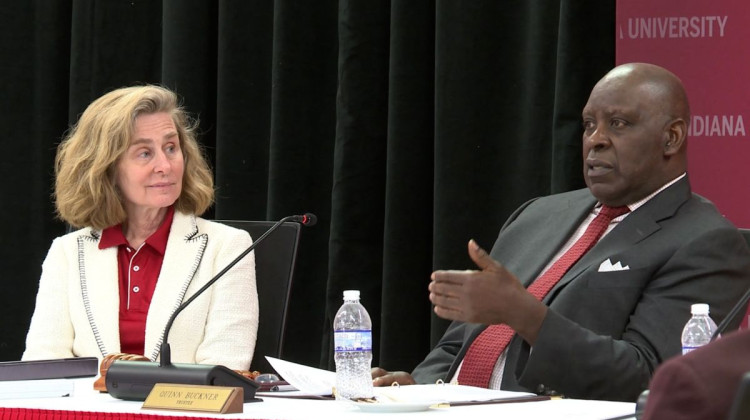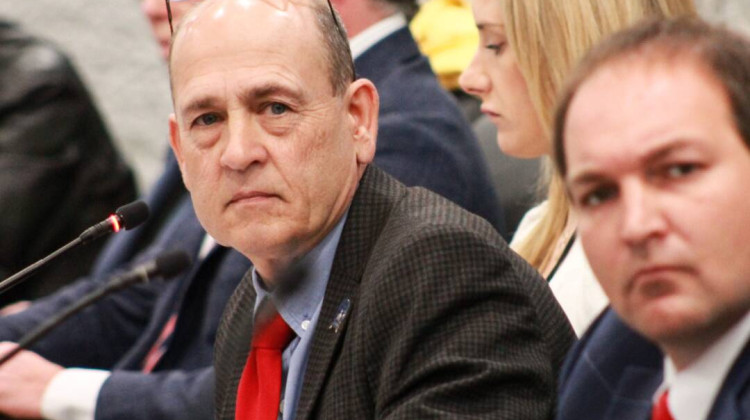
House Republicans unveiled their proposed two-year $43.3 billion state budget Friday, Feb. 17, 2023.
Lauren Chapman / IPBUpdated: 4 p.m. Monday, Feb. 20, 2023
House Republicans wrote a sweeping overhaul to limit local property taxes for public school corporations and opened a new type of funding for charter schools in their proposed two-year state budget.
The change would mandate the amount of funds every public school district and charter school receives for operations — money to cover non-classroom expenses. The proposed amount is $1,400 per student in 2024 and $1,500 per student in 2025.
This would result in charter schools and some small and rural schools getting a boost in state dollars. But a cap on the per student funding amount would also slash millions of dollars in local operation funds at large school districts. That impact would not be immediate – over the next eight years, lower tax rates would be phased in.
Budget architect Rep. Jeff Thompson (R-Lizton) said the proposal equalizes operations funding. Now, the amount of funds a school district receives is dependent on multiple factors, like local property values, and varies significantly between some districts. And charter schools receive no dedicated funds for transportation or facilities.
It’s unfair, Thompson said, for some school districts to take in thousands of dollars in per student funds from local property levies, while other schools have far less support.
“I philosophically can’t continue down that path once I understand it,” Thompson said during a committee hearing on the House budget amendment. “I just think it’s not the right policy for the state.”
To ensure every school receives the same amount of funds, the state would subsidize any traditional public school that generates less than $1,400 per student from its operation levy. The grant would cover the difference between the target amount and local funds.
Charter schools, who do not receive local property taxes, would also receive $1,400 per student next year from state funds. The proposed operations grant would essentially replace a current state grant for charter schools that offers $1,250 per student.
House lawmakers estimate the new operations fund to cost $253.6 million over the next two years.
The provision would also require school corporations to have an operations tax levy of $0.40 or less per $100 of assessed value by 2031. In general, districts with larger tax bases lose money in this model.
As an example, Indianapolis Public Schools could be required to reduce the rate of its current operations tax levy by around 38 percent over the coming years and have its fund cut by tens of millions of dollars.
But projections released by House Republicans show IPS would not face funding cuts in 2024 or 2025 as local assessed property values continue to increase.
A fiscal analysis of the plan and the impact on individual school districts and charter schools is not yet released from the nonpartisan Legislative Services Agency.
The new funding mechanism and grant is wrapped in the House Republicans’ $43.3 billion biennium spending plan. It also includes nearly $18 billion for the K-12 funding formula, an increase of more than 10 percent from the last state budget.
It advanced to the full House on a party line vote.
What does this mean?
Education leaders and lawmakers have long sought a formula to equitably fund schools across Indiana while accounting for the vast differences in urban, suburban and rural communities, and also weighing the multitude of factors that impact students, from poverty to learning English.
School choice advocates have also pushed for increased funds for charter schools as means of providing an equitable education to students and keeping up with district schools who benefit from tax referendum funds.
School districts are funded through a combination of state and local taxes. The state general education fund covers teacher compensation and other classroom expenses. And all schools receive the same base funding for each enrolled student. Additional dollars are added to the basic state grant based on the needs of each district, such as the amount of students in poverty or services for special education.
The local operations fund is generated from a tax levy on property owners in the boundary of each school corporation. This fund can be used for transportation and bus replacement expenses and capital projects, like renovations or new buildings. If a school district wins voter approval for an operating tax referendum, those new funds generated by a tax increase can be used for teacher pay and classroom expenses.
That is the current funding model for traditional public education. When charter schools were created by legislation in 2001, lawmakers provided the same per student funding from the state general education fund as traditional schools. Additional state grants for charter schools have since been enacted. But legislation does not allow charters to levy local property tax funds to cover transportation or facilities. Under this bill, the state would make up for the local tax funds charter schools do not receive through a new grant.
Innovation charter schools, a charter model that requires a contract with a local school district, are not included in this provision. Instead, HB 1001 would create a new grant program for each innovation charter school to receive $1,400 per student in 2024 and $1,500 per student in 2025 to use for facility and transportation costs.
The proposal makes $25 million available for the innovation charter school grants program in the two-year spending plan.
Multiple education organizations WFYI reached out to this declined to comment on the proposal, each citing the need to fully understand the impact of a change to operations funding and other details in the 200 page budget bill.
Contact WFYI education editor Eric Weddle at eweddle@wfyi.org or call (317) 614-0470. Follow on Twitter: @ericweddle.
 DONATE
DONATE






 Support WFYI. We can't do it without you.
Support WFYI. We can't do it without you.